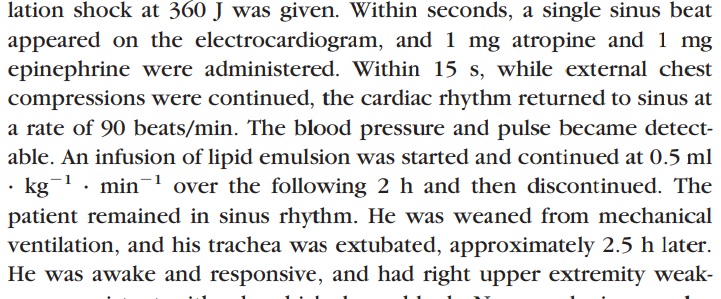Anyone who has done an ALS course will be familiar with the concept of giving a lipid emulsion such as intralipid to combat local anaesthetic toxicity
This all stems from a relatively chance finding in 1998 that the dose of bupivicaine was progressively greater for rats given intralipid infusions in a dose dependent manner.
https://pubmed.ncbi.nlm.nih.gov/9579517/ - further animal data followed in isolated heart and dog studies.
https://pubmed.ncbi.nlm.nih.gov/9579517/ - further animal data followed in isolated heart and dog studies.
It wasn't long before a case report appeared: following a brachial plexus block, a patient seized twice and went into asystole. After 20 minutes of unsuccessful CPR, 100ml of 20% intralipid was administered and the results were dramatic: https://pubmed.ncbi.nlm.nih.gov/16810015/
The rest was history. Further animal studies and case reports emerged of rescue from toxicity due to verapamil, diltiazem, amlodipine, quetiapine, sertraline, haldoperidol, lamotrigine, olanzapine, propranolol, atenolol, etc.
Although no clinical trial/RCT, for obvious reasons.
Although no clinical trial/RCT, for obvious reasons.
So with this level of evidence we must ask: does it work? If so, how?
The initial favoured explanation of a 'lipid sink' that absorbs lipid soluble drugs was compelling and was backed up by animal data showing these drugs sequestered in the lipid phase of centrifuged blood.
The initial favoured explanation of a 'lipid sink' that absorbs lipid soluble drugs was compelling and was backed up by animal data showing these drugs sequestered in the lipid phase of centrifuged blood.
However, experimental and modelling human data would suggest that the volumes of intralipid administered are insufficient to significantly alter a drug's toxicity. https://pubs.asahq.org/anesthesiology/article/118/6/1350/11451/Validity-of-the-Lipid-Sink-as-a-Mechanism-for-the
So, are there other effects of intralipid which might merit translational research elsewhere?
1. Intralipid reduces the size of ischaemia-reperfusion injury via inhibition of mitochondrial permeability pore opening - https://www.ncbi.nlm.nih.gov/pmc/articles/PMC3322241/
2. Intralipid increases cardiac contractility and vascular tone in healthy volunteers https://pubmed.ncbi.nlm.nih.gov/23531591/ https://pubmed.ncbi.nlm.nih.gov/11980566/ and truncates the action potential duration, possibly via changes in intracellular calcium levels https://pubmed.ncbi.nlm.nih.gov/26885303/
3. Rather than a sink, lipid may act as a 'shuttle' for toxic drugs, moving them from sites of toxicity to sites of excretion.
4. Could there be metabolic effects? Fat is the heart's preferred energy source (responsible for 60-70% of ATP production at rest), so it would seem logical that supplementing it would have a benefit although no studies have shown this thus far.
To sum up - fat has a bad popular press, but the idiosyncratic effects of a lipid infusion should give us pause for thought and make us consider its beneficial effects in the heart.

 Read on Twitter
Read on Twitter





